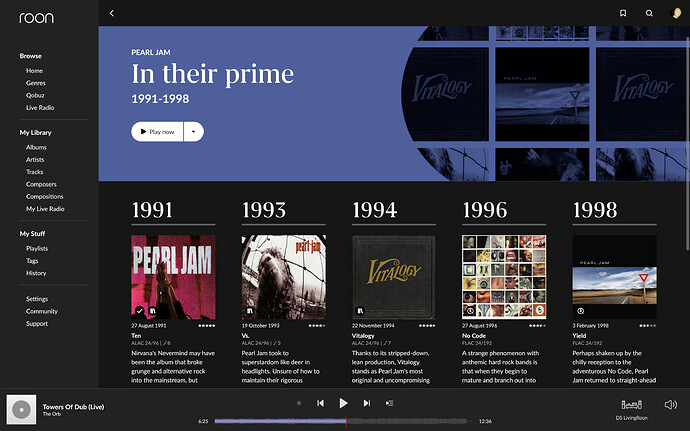Please tell me this topic isn’t serious?
We all know what it means. Nobody said the opposite. Please reply to what people are actually saying. It’s undeniable that we can distinguish between the meaning and the connotations of an expression like “in their prime”…
Nobody in their right mind can deny that “in their prime” is a temporal concept. For this very reason, you can’t apply said concept to an artist’s phase of greatest creativity without referring to their age.
Bands that don’t exist anymore or artists that passed away aren’t usually described as “past their prime.”
I can’t believe I’m actually explaining all of this. In the context of this feature, I pointed out a band that existed from 2000-2014. They had an In Their Prime section that listed their best 3-album run from 2003-2006. This is exactly what the feature is intended to deliver.
And it has nothing to do with the age of the band as I pointed out in my example. A band could have a short lifespan and big impact on their genre. But the idea this feature is ageist when it can refer to an entity of a band that could have started in the players 30’s or 40’s shows age is completely asinine. It sounds like we should hide this terminology to not offend aging Roon customers who look at their library of geezers and feel personally attacked. Or we could just use some common sense.
It seems that 3 interlocking, but logically-distinct issues have been raised.
- Is it useful to highlight the period during which a given artist was at their peak of creativity/productivity?
- How should one refer to that period?
- Do the metadata sources relied-upon by Roon do a good job of identifying said period?
If the answer to (3) is “no”, then I suppose that renders (1) and (2) moot; it would be best to drop this feature. I think, for the sake of argument, it’s worth positing that those sources do an OK, if far-from-perfect job.
If so, then it seems to me that the answer to (1) is a resounding “yes”. Which leaves (2). If “prime” is not the right term to apply to that period, then what is?
I don’t know about musicians, but among academics, it is often said that mathematicians do their best work in their 20s, whereas historians do their best work in their 60s. At least in that context, “prime” is not synonymous with “youth”.
Anyone incapable of distinguishing between the two must be “past their prime”. If my post gets flagged as “inappropriate”, this proves my point.
And “youth” isn’t synonymous with “age”…
Here’s a perfect example of a band compromised of guys who aren’t senior citizens but as a band are past their prime. Pearl Jam isn’t leading rock music in groundbreaking albums the past decade. They’re a 90’s band and this highlights the best albums from the period they had an impact, gives a good quick summation and you can explore from there.
I agree if the feature returns off the wall results, report it and help improve gaps in the machine learning. This isn’t about looking at an artist you know and love and not agreeing, it’s a discovery tool for digging in. I’ve looked at hundreds so far and they seem fairly insightful and give a good jumping off point. But the premise of this thread is ludicrous.
And none of that is pertinent to anything!
“Ageism” isn’t synonymous with discrimination against “senior citizens”, it refers to discrimination against any kind of age group…
BTW, I’m 34…
Oh thanks, I wasn’t aware of that until now!
Yes, and the people saying this kind of stuff are called AGEISTS…
Creative Peak?
Peak Popularity?
To be honest, I can’t either. Everybody gets what you’re saying, but what you don’t seem to get is the difference between denotation and connotation. More information on the former doesn’t change anything about the latter…
- Off-topic, I know, but why do we get star ratings on the ‘prime’ view which is an already culled list, and not on the discography view where they’d be useful?
That was kinda my point.
- Making a sweeping generalization about the creative period of all (or most) mathematicians/historians is ageist.
- Saying that a particular mathematician/historian had their most creative period during a particular decade of their life is not. It’s a critical judgement about the arc of their career.
Oh I get it, I just think anyone making a negative connotation here is making a fuss about nothing. A more revealing library of artists from all eras gives the context of the feature pretty clearly. There’s real issues in 1.8 that need to be addressed. As far as I’m concerned they can get around to changing the words here right after they fix bugs that many of us have had sitting for years.
This really is the thread that keeps on giving … lets argue about what “at their peak” and “at their most popular” would be … and throw in the complication of whether we’re talking about the time the population found them thus or when they recorded and performed their music.
We need complex graphs and a university course on this topic.
The older I get the better my memory tells me I was.
